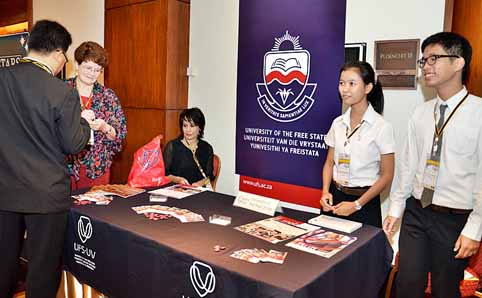 |
|
The UFS’s exhibition at the second International Seminar and QS MasterClass on Internationalisation of Higher Education (iQS) in Thailand.
19 March 2012
|
We increased our stature in Asia by presenting the International Seminar and QS MasterClass on Internationalisation of Higher Education (iQS) in Thailand in cooperation with four universities from the region.
The UFS presented the seminar together with Mahasarakham University of Thailand, Guangxi University for Nationalities in China, Universiti Teknologi Malayisiaand the University of the Philippines Diliman. The UFS’s involvement in the seminar is the result of a cooperation agreement that was signed with Mahasarakham University, the host of the seminar. The UFS is the first university in Africa that has a cooperation agreement with Mahasarakham.
Prof. Driekie Hay, Vice-Rector: Academic, and Prof. Annette Wilkinson, Professor-Researcher at the Centre for Teaching and Learning, represented the UFS. They ensured that delegates to the seminar were aware of what was happening at Kovsies. Prof. Hay took part in a panel discussion. She also delivered a paper in which she looked at the implications of internationalisation on curricula. The UFS also had an exhibition at the event.
Prof. Wilkinson said the seminar offers universities in that part of the world the opportunity to improve their position internationally by exchanging knowledge and ideas. She said the approximately 130 delegates showed considerable interest in the UFS.
“A number of Mahasarakham University’s lecturers and management, as well as some of the other delegates, expressed an interest in visiting the UFS and in fostering closer ties.”